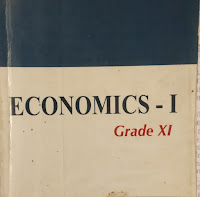Robbins's definition of economics
Robbins's Definition....
After criticizing Marshall's definition in his book "An Essay on the Nature and significance of Economic Science" published in 1932 AD. Professor Robbins gave his own views about economics. According to him, "Economics is the science which studies human behavior as a relationship between ends and scarce means which have alternative uses. " This definition is called modern definition, scientific and logical definition. It's regarded as superior than other definitions. This definition was supported by various modern economists like Barbara Wotton, Paul Samuelson, J. M Keynes, Mahabub Ul Haq etc.
Following are the major features of this definition:-
1. Unlimited ends: The word 'ends' of this definition refers human wants which are unlimited. We can't satisfy all the wants at a time. When we satisfy single want, other wants immediately crop up. In this way, human wants go on increasing endlessly. Not only human wants are unlimited but they are recurring also.
2. Limited or scarce means: Most of the resources which are used to satisfy human wants are limited in supply. Therefore, we are forced to postpone the satisfaction of many of our wants.
3. Means have alternative uses: The available resources aren't only limited but have many uses. The same resources can be used to satisfy any of our many wants i.e resources have alternative uses.
4. Wants are of different intensities: Human wants are unlimited but all wants aren't equally important or urgent. Some wants are more important than others which need immediate satisfaction, while other can be postponed. Present wants are more important than future. Thus, a man is forced to choose between wants deu to their different importance or intensities.
5. Problem of choice: Choice making is really an economic problem. We know that human beings face scarcity of resources. So they are forced to make a choice in their present and future satisfaction of wants and their allocation of resources.
Criticisms.....
The definition given by Robbins is logical and scientific but it's also not free from limitations/criticisms which are as follows:
1. Self contradictory: Robbins contradicted himself for his two views. First he said that economics is neutral between wants and second he considered economics as a science of choice. These two properties are self -contradicted because the choice between wants and the allocation of resources is simply not possible without the knowledge of relative importance of different wants.
2. Concealed concept of welfare: Robbins has rejected Marshall's definition for its welfare content. But some of the economists claimed that Robbins's definition has the concealed concept of welfare. Robbins used the term satisfaction in place of welfare but the meaning and sense of these two terms is similar.
3. Pure science: According to Robbins, economics is a pure/positive science and it's concerned with the formulation of economic theories having to do nothing with practice. But economics isn't only positive science it's also a normative science because economists are not only tools maker but also tools users.
4. Economic problems not only arise from scarcity: According to Robbins, economic problems are arised due to scarcity only. But according to critics, the economic problems are also arised from sufficient resources. For example: poverty, unemployment, inflation, deflation etc.
5. Ignorance of economic problems: According to critics, Robbins's definition hasn't covered the present days problems like inflation, deflation, unemployment, economic development etc.




Comments
Post a Comment
If you have any problem then share with me.